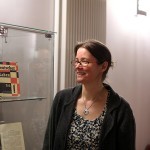I’m just back from travels in Luxembourg (well, the airport!), Switzerland and Germany. German specialists like me love to cite Luxembourg and Switzerland as examples of societal multilingualism, where individual plurilingualism is very common. So it was interesting to experience the reality. Not all was entirely as I expected.
In officially trilingual Luxembourg, both French and German are official languages, but Luxembourgish (which is, on purely linguistic criteria, a West-Central German dialect) has been the designated “national language” since 1984. At the airport enquiry desk, I asked my question in French (French is much used in administration), and was duly answered in French. The taxi driver definitely wanted to speak German, though. What I didn’t see at the airport were any signs in Luxembourgish – its status as a national language apparently doesn’t get reflected in the “linguistic landscapes” of the airport. That is noticeably different to, say, arriving in Dublin’s airport. There, Irish – like Luxembourgish, a national language spoken by relatively few of the visitors passing through – is nevertheless immediately visible on every sign. I’m not sure how to interpret that difference.
My next destination was Fribourg/ Freiburg, in one of three officially bilingual cantons in multilingual Switzerland (take the trilingual fire extinguisher in the photo as evidence!).

Being a languages fan, I had half-expected to feel something magically heartwarming about Swiss plurilingualism. Instead, I was struck by two somewhat contradictory points. First, by how matter-of-factly people moved between languages when it was needed. Everyone spoke what they could, and if someone struggled, you accommodated. In the class where I was giving a lecture paper, French, German and English were all used, depending on who had initiated the conversation, even if once the class itself began, I lectured in English. (And of course, there’s the question of which German: among themselves, Swiss Germans use their dialect, quite different to the Swiss Standard German used to communicate with anyone else using German).
Second, I was equally struck, even in this officially bilingual city, by how obviously most people still have a primary language that they feel most comfortable using. Plurilingualism, yes, but that doesn’t mean feeling equally at home in both (or all) languages. There are sensitivities, too. According to the colleagues I met, in their classes at the University there is a roughly equal mix of French and German-speaking students, and a good smattering of Italian. When students from this trilingual mix need to interact, they apparently often choose a fourth language, English, as the inoffensive shared language that privileges no one.
So from there it was interesting to head to my last stop, an international conference in Bremen, in the north of Germany. Ironically, this was the most intensively plurilingual part of my trip. A great many Germans spent three days talking to each other in English at the conference, and German in the breaks. Until, that is, a speaker got up to explain that he was giving a paper about the history of teaching German in Germany, that he was German, and we were all in Germany. Thus, he would speak in German. It sounds like mere common sense, but it felt strangely like a political act of resistance to the hegemony of English.
So, what was my take-home (apart from plenty of excellent German and Swiss chocolate)? There are different kinds of plurilingualism – and not all of them are as egalitarian as we might wish to think.
Note: comments are moderated before publication. The views expressed in the comments are those of our users and do not necessarily reflect the views of the MEITS Project or its associated partners.







